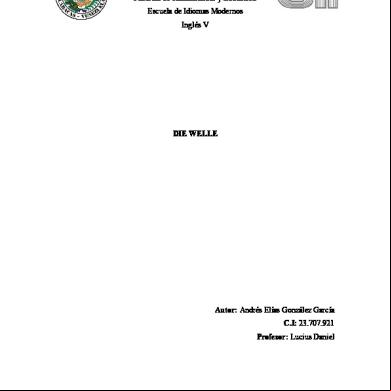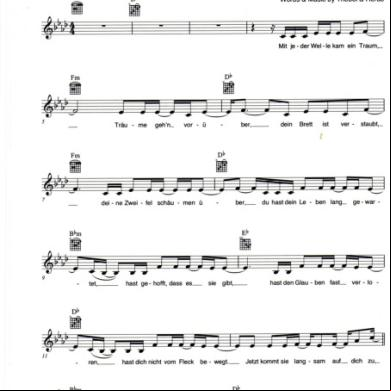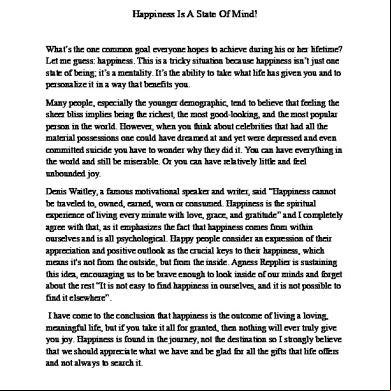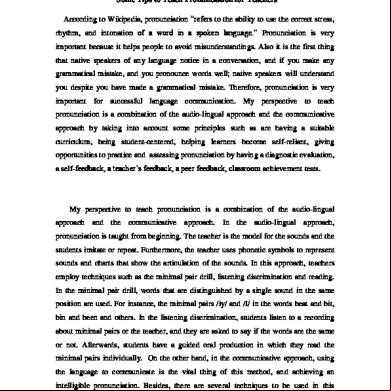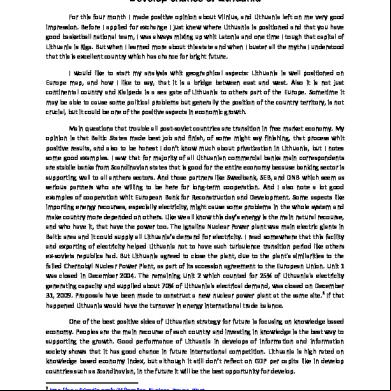Essay About Die Welle 3s464e
This document was ed by and they confirmed that they have the permission to share it. If you are author or own the copyright of this book, please report to us by using this report form. Report 3i3n4
Overview 26281t
& View Essay About Die Welle as PDF for free.
More details 6y5l6z
- Words: 1,314
- Pages: 4
República Bolivariana de Venezuela Universidad Central de Venezuela Facultad de Humanidades y Educación Escuela de Idiomas Modernos Inglés V
DIE WELLE
Autor: Andrés Elías González García C.I: 23.707.921 Profesor: Lucius Daniel
Caracas, 4 de marzo de 2015
World War II left a legacy of death and destruction in all Europe. Not only the lives of 50 Million people were lost, but the whole world was able to witness the evil that was brought by the political and ideological movement used by Hitler and Mussolini: fascism. Nowadays, first half of the XXI century, 75 years have ed since the Soviet Union and America advanced successfully against the Axis, forcing the German capitulation both in Rheims and Berlin. Since then, History itself has progressively revealed the consequences of the anti-Semitism that produced the systematic death of millions of Jews, and step by step those empires involved in the catastrophe have assumed and implicit but necessary historic responsibility. Now, documentaries and master classes, speeches and commemorations about the topic are plentiful. In this context a high school professor named Ron Jones decided to make an experiment in order to explain his students how it was possible that a political project with such dangerous nature like fascism could persuade enough ers to put Hitler in the German Chancellor’s Office and throw Europe in an international chaos. Titled The Third Wave, this experiment consisted in the creation of an ideological group with strong nationalistic foundations that could modify the patterns of behavior of any community (in this case his own students) through the use of persuasion, identity and human nature itself. Inspired in the academic success of Ron Jones’ experiment, director Dennis Gansel observed a great amount of parallelisms between the American society of the second half of the XX century and the German society that exists today. If the American students of back then could not conceive that Germans felt attracted to the ideas of fascism, the German students that belong to the third generation since the ending of WWII took for granted that it was impossible that fascism could be established once again in Europe. That is how Die Welle was born. Die Welle (The Wave, in English) is a sociopolitical thriller which, based on Ron Jones’ experiment, tells the story of a course and its professor, Reiner Wenger. When he realizes of the lack of disposition that his own students have when addressing the topic of National Socialism or talking about figures like Hitler and Mussolini, he decides to make and experiment in order to prove how easily fascism could become a popular movement in . Just like Ron Jone’s experiment, the experiment made by Reiner would last five complete days. Reiner Wenger (Jürgen Vogel) is the kind of teacher that is popular and respected among students. Dressing with mostly punk bands T-shirts, he is considered the cool teacher who in every vacation break dictates Anarchy as an optional subject in a high school of a tiny German town. However, because of a conflict with another professor he is obligated to dictate the subject of Autocracy. When he finds himself in front of a course of German students sick and tired of talking about Hitler, he decides to
make a theorical-practical experiment as a pedagogic resource to teach them how fascist groups form and how their behave. The Project is based on the principles on which the National Socialism was established in the of the XX century: Power through discipline, power through union and power through force. The experiment has different stages, being the first one the modification of the rules in class. In order to intervene the students would have to stand up and give clear concise answers, addressing their teacher not as Reiner but Herr Wenger (or Mr. Wenger), which is now the main figure of the course, the Führer. The groups of friends that usually form in the classroom are separated and the students with best grades are placed next to the ones with bad grades in order to increase and guarantee the efficiency of the course. Later on a uniform is decided so they can differentiate themselves from the rest of the school. This uniform consists of a white shirt that preserves decorum and equality, eliminating in the process any sign of individualism. The students learn how to march rhythmically, not only to sabotage the anarchy class that has its classroom downstairs, but to consolidate the course as a unified entity. Then the now created movement chooses Die Welle as its name in order to unify all its under the same identity. After those first steps the movement reaches to a point in which it assumes own independence and self-development. The students, without Herr Wenger’s suggestion, decide to create a salute and a symbol that could represent them. The course begins to acquire an uncontrollable popularity and dozens of students that were initially not even part of the course begin to participate actively in the movement. Parties exclusive for are organized, and little by little discrimination arises between the of Die Welle and the rest of the school population. The assume the implicit responsibility of promoting his ideas not only in the classroom or the school, but also throughout the town, causing friction between them and groups of anarchists. Breaking point is the scene in which Tim (Frederick Lau) stands along with his friend against one of those anarchist groups, drawing a gun in front of everybody. Completely frightened, anarchists run away and Tim’s friends immediately reject the action while he excuse himself saying that the gun only fires fake bullets. In the course only one student stands up against Die Welle after realizing about the dangerous nature that movement begins to acquire: Karol (Jennifer Ulrich). Even though she is one of the students with the highest grades, the movement begins to ostracize and attack her after she says she do not like the uniform that she is being forced to wear. The circumstances turn her not only into a pariah in the course, but also into a symbol of the opposition of Die Welle. In a scene where the of the movement are ing the school swimming team in a competition against the team on another school, Karl decides to spread anti-Die Welle propaganda, causing a brawl in the swimming pool area. She is silenced by her own classmates, who rush to take all the flyers and destroy them. Slowly
but surely she opens the eyes of her boyfriend, Marko (Max Riemelt), who in the final day of the experiment stands up against Die Welle and his teacher, claiming that everything has gone too far. Reiner Wenger, in his role as a dictator, orders to the other students to catch Marko so he can be punished for treason. That way the experiment finishes, and Reiner gives a speech in which he repudiates the fanatic behavior of his students. However, Tim, that had developed an obsession with Die Welle, draws his gun and in a burst of insanity he shoots to one of his best friends, Bomber (Maximillian Vollmer). When he realizes what he had done, he turns the gun at himself, and shoots. The ending of Die Welle is the result of the consequences that are brought by boundless power. Throughout the movie the audience can appreciate scenes that symbolize and make reference to the political reality of a lot of countries around the world. The promotion of discrimination and hate against the dissidence and to anyone that has an opinion against the established system. Censorship of ideas, convincing persuasion that appeals to our identity, to who we are. The lack of space for individualism. Die Welle shows how easy we can forget the principles of democracy and be seduced by the supremacy of autocracy, a State that does not it anything outside itself.
DIE WELLE
Autor: Andrés Elías González García C.I: 23.707.921 Profesor: Lucius Daniel
Caracas, 4 de marzo de 2015
World War II left a legacy of death and destruction in all Europe. Not only the lives of 50 Million people were lost, but the whole world was able to witness the evil that was brought by the political and ideological movement used by Hitler and Mussolini: fascism. Nowadays, first half of the XXI century, 75 years have ed since the Soviet Union and America advanced successfully against the Axis, forcing the German capitulation both in Rheims and Berlin. Since then, History itself has progressively revealed the consequences of the anti-Semitism that produced the systematic death of millions of Jews, and step by step those empires involved in the catastrophe have assumed and implicit but necessary historic responsibility. Now, documentaries and master classes, speeches and commemorations about the topic are plentiful. In this context a high school professor named Ron Jones decided to make an experiment in order to explain his students how it was possible that a political project with such dangerous nature like fascism could persuade enough ers to put Hitler in the German Chancellor’s Office and throw Europe in an international chaos. Titled The Third Wave, this experiment consisted in the creation of an ideological group with strong nationalistic foundations that could modify the patterns of behavior of any community (in this case his own students) through the use of persuasion, identity and human nature itself. Inspired in the academic success of Ron Jones’ experiment, director Dennis Gansel observed a great amount of parallelisms between the American society of the second half of the XX century and the German society that exists today. If the American students of back then could not conceive that Germans felt attracted to the ideas of fascism, the German students that belong to the third generation since the ending of WWII took for granted that it was impossible that fascism could be established once again in Europe. That is how Die Welle was born. Die Welle (The Wave, in English) is a sociopolitical thriller which, based on Ron Jones’ experiment, tells the story of a course and its professor, Reiner Wenger. When he realizes of the lack of disposition that his own students have when addressing the topic of National Socialism or talking about figures like Hitler and Mussolini, he decides to make and experiment in order to prove how easily fascism could become a popular movement in . Just like Ron Jone’s experiment, the experiment made by Reiner would last five complete days. Reiner Wenger (Jürgen Vogel) is the kind of teacher that is popular and respected among students. Dressing with mostly punk bands T-shirts, he is considered the cool teacher who in every vacation break dictates Anarchy as an optional subject in a high school of a tiny German town. However, because of a conflict with another professor he is obligated to dictate the subject of Autocracy. When he finds himself in front of a course of German students sick and tired of talking about Hitler, he decides to
make a theorical-practical experiment as a pedagogic resource to teach them how fascist groups form and how their behave. The Project is based on the principles on which the National Socialism was established in the of the XX century: Power through discipline, power through union and power through force. The experiment has different stages, being the first one the modification of the rules in class. In order to intervene the students would have to stand up and give clear concise answers, addressing their teacher not as Reiner but Herr Wenger (or Mr. Wenger), which is now the main figure of the course, the Führer. The groups of friends that usually form in the classroom are separated and the students with best grades are placed next to the ones with bad grades in order to increase and guarantee the efficiency of the course. Later on a uniform is decided so they can differentiate themselves from the rest of the school. This uniform consists of a white shirt that preserves decorum and equality, eliminating in the process any sign of individualism. The students learn how to march rhythmically, not only to sabotage the anarchy class that has its classroom downstairs, but to consolidate the course as a unified entity. Then the now created movement chooses Die Welle as its name in order to unify all its under the same identity. After those first steps the movement reaches to a point in which it assumes own independence and self-development. The students, without Herr Wenger’s suggestion, decide to create a salute and a symbol that could represent them. The course begins to acquire an uncontrollable popularity and dozens of students that were initially not even part of the course begin to participate actively in the movement. Parties exclusive for are organized, and little by little discrimination arises between the of Die Welle and the rest of the school population. The assume the implicit responsibility of promoting his ideas not only in the classroom or the school, but also throughout the town, causing friction between them and groups of anarchists. Breaking point is the scene in which Tim (Frederick Lau) stands along with his friend against one of those anarchist groups, drawing a gun in front of everybody. Completely frightened, anarchists run away and Tim’s friends immediately reject the action while he excuse himself saying that the gun only fires fake bullets. In the course only one student stands up against Die Welle after realizing about the dangerous nature that movement begins to acquire: Karol (Jennifer Ulrich). Even though she is one of the students with the highest grades, the movement begins to ostracize and attack her after she says she do not like the uniform that she is being forced to wear. The circumstances turn her not only into a pariah in the course, but also into a symbol of the opposition of Die Welle. In a scene where the of the movement are ing the school swimming team in a competition against the team on another school, Karl decides to spread anti-Die Welle propaganda, causing a brawl in the swimming pool area. She is silenced by her own classmates, who rush to take all the flyers and destroy them. Slowly
but surely she opens the eyes of her boyfriend, Marko (Max Riemelt), who in the final day of the experiment stands up against Die Welle and his teacher, claiming that everything has gone too far. Reiner Wenger, in his role as a dictator, orders to the other students to catch Marko so he can be punished for treason. That way the experiment finishes, and Reiner gives a speech in which he repudiates the fanatic behavior of his students. However, Tim, that had developed an obsession with Die Welle, draws his gun and in a burst of insanity he shoots to one of his best friends, Bomber (Maximillian Vollmer). When he realizes what he had done, he turns the gun at himself, and shoots. The ending of Die Welle is the result of the consequences that are brought by boundless power. Throughout the movie the audience can appreciate scenes that symbolize and make reference to the political reality of a lot of countries around the world. The promotion of discrimination and hate against the dissidence and to anyone that has an opinion against the established system. Censorship of ideas, convincing persuasion that appeals to our identity, to who we are. The lack of space for individualism. Die Welle shows how easy we can forget the principles of democracy and be seduced by the supremacy of autocracy, a State that does not it anything outside itself.
